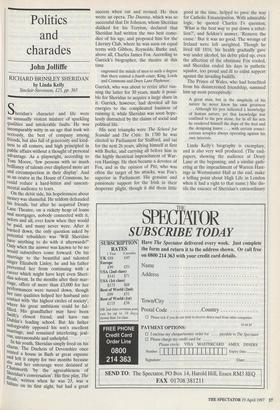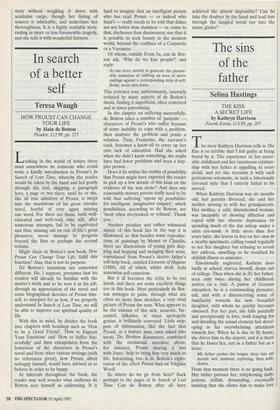Politics and charades
John Jolliffe
RICHARD BRINSLEY SHERIDAN
by Linda Kelly Sinclair-Stevenson, f25, pp. 365 Sheridan's character and life were an unusually violent mixture of sparkling qualities and intolerable faults. He was Incomparably witty in an age that took wit seriously, the best of company among friends, but also full of generosity and kind- ness to all corners, and high principled in public affairs without a thought of personal advantage. As a playwright, according to Tom Moore, `few persons with so much brilliancy of talents ever displayed more art and circumspection in their display'. And as an orator in the House of Commons, he could reduce a hard-bitten and unsenti- mental audience to tears.
On the debit side, his hopelessness about money was shameful. He seldom defrauded his friends, but after he acquired Drury Lane Theatre, on a rickety heap of loans and mortgages, nobody connected with it, actors and all, ever knew when they would be paid, and many never were. After it burned down, the only question asked by Potential rebuilders was 'Will Sheridan have anything to do with it afterwards?' Only when the answer was known to be no Would subscribers come forward. On his Marriage to the beautiful and talented singer Elizabeth Linley, he and his father Prevented her from continuing with a career which might have kept even Sheri- dan solvent. In the months after their mar- riage, offers of more than £3,000 for her performances were turned down, though her rare qualities helped her husband into contact with 'the highest circles of society', Where his great ambitions could be ful- filled. His grandfather may have been Swift's closest friend, and have run Dublin's leading school. But his father unforgivably opposed his son's excellent Marriage, and remained interfering, jeal- ous, unreasonable and unhelpful. In his youth, Sheridan simply lived on his charm. The Duchess of Devonshire once rented a house in Bath at great expense and left it empty for two months because she and her entourage were detained at Chatsworth hatsworth 'by the agreeableness of Rivals, conversation'. His first play, The T !'als, written when he was 23, was a 'allure on its first night, but had a great success when cut and revised. He then wrote an opera, The Duenna, which was so successful that Dr Johnson, whom Sheridan disliked for his Toryism, declared that Sheridan had written the two best come- dies of his age, and proposed him for the Literary Club, where he was soon on equal terms with Gibbon, Reynolds, Burke and, above all, Charles James Fox. According to Garrick's biographer, the theatre at this time engrossed the minds of men to such a degree that there existed a fourth estate, King, Lords and Commons and Drury Lane Playhouse.
Garrick, who was about to retire after run- ning the latter for 30 years, made it possi- ble for Sheridan to acquire a large share in it. Garrick, however, had devoted all his energies to the complicated business of running it, while Sheridan was soon hope- lessly distracted by the claims of social and political life. His next triumphs were The School for Scandal and The Critic. In 1780 he was elected to Parliament for Stafford, and sat for the next 26 years, allying himself at first with Burke, and carrying all before him in the highly theatrical impeachment of War- ren Hastings. He then became a devotee of Fox, and in the opinion of Pitt, who was often the target of his attacks, was Fox's superior in Parliament. His genuine and passionate support for the Irish in their desperate plight, though it did them little good at the time, helped to pave the way for Catholic Emancipation. With admirable logic, he quoted Charles I's question, `What is the best way to put down a rebel- lion?', and Seldon's answer, 'Remove the cause.' But it was no good. The wrongs of Ireland were left unrighted. Though he lived till 1816, his health gradually gave way under alcohol, his debts piled up, even the affection of the obstinate Fox cooled, and Sheridan ended his days in pathetic squalor, too proud and ill to enlist support against the invading bailiffs.
The Prince of Wales, who had benefited from his disinterested friendship, summed him up most perceptively:
A great man, but in the simplicity of his nature he never knew his own greatness . Although his pen indicated a knowledge of human nature, yet that knowledge was confined to his pen alone, for in all his acts he rendered himself the dupe of the fool and the designing knave . . . with certain consci- entious scruples always operating against his own interests.
Linda Kelly's biography is exemplary, and is also very well produced. (The end- papers, showing the audience at Drury Lane at the beginning, and a similar gath- ering at the impeachment of Warren Hast- ings in Westminster Hall at the end, make a telling point about High Life in London when it had a right to that name.) She dis- tils the essence of Sheridan's extraordinary story without weighing it down with academic cargo, though her listing of sources is admirable, and underlines her thoroughness. It is a highly readable story, ending in more or less foreseeable tragedy, and she tells it with wonderful fairness.



































































 Previous page
Previous page